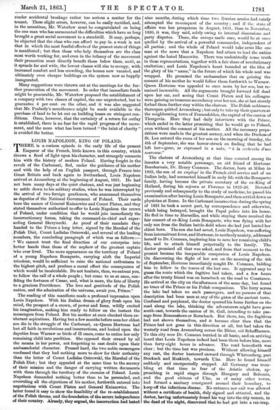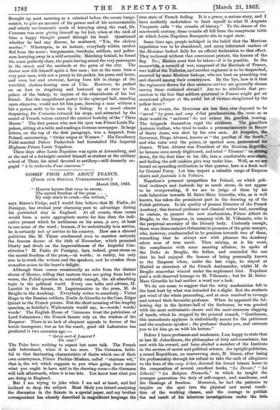LOUIS NAPOLEON, KING OF POLAND.
THERE is a curious episode in the early life of the present Emperor of the French, little known in this country, which throws a flood of light upon his character, and strangely connects him with the history of modern Poland. Having fought in the revolt of the Carbonari, fled, under the guidance of his mother and with the help of an English passport, through France into Great Britain and back again to Switzerland, Louis Napoleon arrived at Arenenberg at the beginning of August, 1831. He had not been many days at the quiet chateau, and was just beginning to settle down to his military studies, when he was interrupted by the arrival of two foreign gentlemen, who announced themselves as deputies of the National Government of Poland. Their cards bore the names of General Kniazewicz and Count Platen, and they stated themselves authorized to offer to Louis Napoleon the crown of Poland, under condition that he would join immediately the insurrectionary forces, taking the command-in-chief and super- seding General Skrzynecki. As proof of their mandate they handed to the Prince a long letter, signed by the Marshal of the Polish Diet, Count Ladislas Ostrowski, and several of the leading members, the concluding paragraph of which was as follows :— 4' We cannot trust the final direction of our enterprise into better hands than those of the nephew of the greatest captain who ever lived. The mere appearance on the territory of Poland of a young Napoleon Bonaparte, carrying aloft the Imperial tricolour, would be sufficient to raise the national enthusiasm to the highest pitch, and produce a moral effect the consequence of which would be incalculable. Do not hesitate, then, we entreat you, to follow the call of a whole people ; but come to us at once, con- fiding the fortunes of Cam; and, what is more, the fate of liberty to a gracious Providence. The love and gratitude of the Polish nation, and the admiration of the universe, await you, Prince."
The reading of this manifesto made a profound impression upon Louis Napoleon. With his Italian dream of glory fresh upon his mind, the prospect of a crown, of power and fame, wildly excited his imagination, making him ready to follow on the instant the messengers from Poland. But his mother at once checked these ex- uberant aspirations. Having but a few months before seen her eldest son die in the struggle of the Carbonari, ex-Queen Hortense had lost all faith in revolutions and insurrections, and looked upon the deputies from Warsaw as birds of ill omen, come to entice her only remaining child into perdition. She opposed their errand by all the means in her power, not forgetting to cast doubt upon their ambassadorial character. Pressed hard, the two noble messengers confessed that they had nothing more to show for their authority than the letter of Count Ladialaa Ostrowski, the Marshal of the Polish Diet ; but they appealed at the same time to the secrecy of their mission and the danger of carrying written documents with them through the territory of the enemies of Poland. Louis Napoleon demanded nothing better than to be persuaded, and overruling all the objections of his mother, forthwith entered into negotiations with Count Platen and General Kniazewicz. The latter found it easy to show the feasibility of the re-establishment of the Polish throne, and the foundation of the secure independence of their country. Already, they argued, the insurrection hid lasted
nine months, during which time two Russian armies had.vainly attempted the re-conquest of the country ; and if the state of affairs was less prosperous in August, 1831, than in November, 1830, it was, they said, solely owing to internal dissensions and party disputes. These, the envoys made sure, would be at once quelled by the arrival of a powerful commander, independent of all parties ; and the whole of Poland would take arms like one man at the news that a Napoleon had arisen to lead the nation against the hated Muscovite. There was undoubtedly some truth in these representations, together with a fair share of revolutionary exaltation ; and Louis Napoleon's heart bounded at the idea of the glory of his "name," in the future of which his whole soul was wrapped. He promised the ambassadors that on gaining the consent of his mother he would follow them forthwith to Warsaw.
Queen Hortense was appealed to once more by her son, but re- mained inexorable. All the arguments brought forward fell dead upon her ear, and seeing that Count Platen and his colleague were gaining an immense ascendancy over her son, she at last sternly forbad them further stay within the chateau. The Polish noblemen thereupon quitted Arenenberg ; but only to take up their quarters at the neighbouring town of Frauenfelden, the capital of the canton of 'Thurgovia. Here they had daily interviews with the Prince, which ended in the latter promising that he would go to Poland, even without the consent of his mother. All the necessary prepa- rations were made in the greatest secrecy, and when the Duchess of St. Lea entered the room of her son on the morning of Sunday, the 4th of September, she was horror-struck on finding that he had left her—gone, as expressed in a note, " 81 /a recherche d'une couronne."
The chateau of Arenenberg at that time counted among its inmates a very notable personage, an old friend of Hortense
Beauharnais, Dr. Henry Conneau. The doctor, born at Milan in 1803, the son of an employe in the French civil service and of an Italian lady, had connected himself in early life with the Bonaparte family, having become the private secretary of the ex-King of Holland, during his sojourn at Florence in 1823-26. Devoted previously and subsequently to the study of medicine, he passed his examination after leaving Louis Bonaparte, and then settled down as physician at Rome. In the Carbonari insurrection during the spring of 1831 he took a secret part, by correspondence and otherwise, which being betrayed, brought the Papal police into his house. He fled in time to Marseilles, and while staying there received the fair consort of ex-King Louis Bonaparte, who was flying with her only son from the Italian battle-field where she had just buried her eldest born. The son she had saved, Louis Napoleon, was suffering from intermittent fever, and Hortense, in motherly anxiety, addressed herself to Dr. Conneau, imploring him to save her remaining child's life, and to attach himself perpetually to the family. The doctor promised all that was asked, and from that moment to the present became the inseparable companion of Louis Napoleon. On discovering the flight of her son on the morning of the 4th of September, Hortense immediately sought Dr. Conneau, bidding him to follow in the traces of the lost one. It appeared easy to guess the route which the fugitive had taken, and a few hours after the trusty friend was on horseback on the road to Constance. He arrived at the city on the afternoon of the same day, but found no trace of the Prince or his Polish companions. The ferry across the lake had taken no such passengers, and no persons of that description had been seen at any of the gates of the ancient town. Confused and perplexed, the doctor spurred his horse further on the road along the lake, thinking the adventurers might have gone south-east, towards the canton of St. Gall, intending to take pas- sage from Romanshoni or Rorschach. But there, too, the fugitives had not shown themselves, and it became clear then that the Prince had not gone in this direction at all, but had taken the westerly road from Arenenberg across the Rhine, via Schaffhausen. To this city now Dr. Conneau hurried in all haste, and on arriving heard that Louis Napoleon indeed had been there before him, more than forty-eight hours in advance. The road henceforth was clear ; but the time lost was precious. Without allowing himself any rest, the doctor hastened onward through Wfirtemberg, past Stockach and Moskirch, towards Ulm. Here he found himself suddenly and unexpectedly stopped. All Germany was trem- bling at that time in fear of the Asiatic cholera, ap- proaching in rapid stages through Hungary and Bohemia, and the good citizens of Ulm, as of many other towns, had formed a sanitary coastguard around their boundary, to keep off the infectious disease. No entrance nor exit was allowed without a certificate of health, duly signed and attested, and the doctor, having unfortunately found his way into the city unseen, in the dead of the night, discovered that he had got into a rat-trap.
Brought up next morning as a criminal before the severe burgo- master, to give an account of his person and of his unwarrantable and utterly un-Germanic mode of hurrying along the road, Dr. Conneau was near giving himself up for lost, when at the nick of time a happy thought passed through his head. Questioned whether he had any disease, he muttered, "Yes, the cholera morbus." Whereupon, in an instant, everybody within earshot fled from the scene ; burgomaster, turnkeys, soldiers, and police- men hurrying away in a wild scramble. Marching behind, he found the coast perfectly clear, the panic having seized the very passengers in the street, and the sentinels at the gates of the city. The doctor now felt himself again a free man ; but at the same time a very poor man, with not a penny in his pocket, his purse and horse, and even hat and overcoat, having been left in charge of the watchful, cholera-fearing men of Ulm. However, he pushed on on foot to Augsburg and hastened up at once to the palace of the bishop, to inquire of the whereabouts of his lost friend. But the magnificent porter in the episcopal hall, standing upon etiquette, would not let him pass, deeming a man without a hat a person unfit to be seen by a bishop. In a mood almost despairing, Dr. Conneau retraced his steps, and attracted by the sound of French voices, entered the ancient hostelry of the "Three Moors." The first person who met his eyes was Prince Louis Na- poleon, sitting at a table and reading a German newspaper. In large letters, on the top of the first paragraph, was a despatch from Poland, announcing, "Order reigns at Warsaw." His Excellency Field-marshal Prince Paskevitch had forestalled His Imperial Highness Prince Louis Napoleon.
Three days after Louis Napoleon was again at Arenenberg, and at the end of a fortnight entered himself as student at the military school of 'Thun, his mind devoted to artillery—still dreamily en- gaged "l la recherche d'une couronne."































 Previous page
Previous page